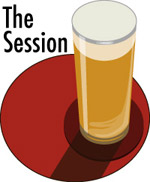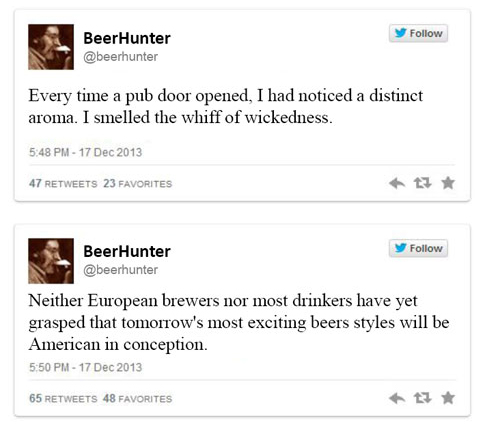 The topic for Session #110 topic is Twitter. And, among other things, host Sean Inman suggested considering “brevity and how it affects writing about beer.” I’m not sure the example Inman uses, a long thought that Ray Daniels broke into tweetable parts, is the best example. He didn’t try to condense it into one 140-character passage (or even two or three).
The topic for Session #110 topic is Twitter. And, among other things, host Sean Inman suggested considering “brevity and how it affects writing about beer.” I’m not sure the example Inman uses, a long thought that Ray Daniels broke into tweetable parts, is the best example. He didn’t try to condense it into one 140-character passage (or even two or three).
In another life, I was briefly in charge of a newspaper photo department. Photos are often a better way to tell a story — you know, the picture is worth . . . thing — but newspapers have a finite amount of space. So there were conversations with questions like, “Can you tell this story in five pictures? Three?” Some of the most powerful stories turned out to be just a few photos, or even one.
Another example of powerful shortform writing, of course, is song. The first time we saw Joe Ely perform Robert Earl Keen’s “The Road Goes on Forever” and he introduced it as a novel in 4 minutes and 33 seconds. He was write. The lyrics fit on a t-shirt. I know; I own one.
Twitter can work that way, striking a blow for brevity. But often a tweet includes a summary of something longer and a link to the rest. So is that really brevity? For the Craft Writing conference in Lexington, Kentucky, a couple years ago I put together a few pseudo tweets from Michael Jackson. Pardon the less than perfect artwork and the fact that they don’t include links to longer articles. I think you’ll get the point.

The first excerpt came from a story Jackson wrote for Slow magazine (from Slow Food) that no longer seems to be available online. The second from his last book. It stands nicely alone, but the first reminds us that context matters and some stories deserve more than 140 characters.
The essay titled “The Pub Door” first appeared in Slow, Slow Food’s journal. The Beer Hunter as beer expert appears only briefly, well into the story to provide a quick introduction to Brettanomyces, a so-called wild yeast that can add positive or negative qualities to a beer. “Today it is part of my job to taste beer professionally,” Jackson wrote. “A colleague will sometimes ask: ‘Do you get Brett in this one?” From a scientific viewpoint that conclusion might be sufficient.”
The story began with his mother picking up the pace each time they neared a pub in the town where they lived. “I was four years old,” he wrote. “My legs could scarcely keep up the pace. I felt as though my feet would leave the ground. Had I been in a cartoon, they would have done. I would have been dragged horizontally. I doubt my mother would not have noticed.”
He later asked her what people did in the pubs and she said only that she did not know. “Whatever was going on in there my mother seemed to deem worthy of Dante,” he wrote. “If it was that bad, it must be good, I concluded. She pulled me away, but it was too late. Every time a pub door opened, I had noticed a distinct aroma. I had smelled the whiff of wickedness.”
The first time he knowingly smelled Brett the aroma was exactly the same. He wrote: “I have not yet managed to summarize in a tasting note the images that are triggered when I smell Brett: neither the big picture, the rise and fall of British industrial might, nor the cameo, the alienation experienced by my mother.
“If I could distill her story and mine, they would not be experiences shared and understood by every reader. We each have our own repertoire of memories and emotions triggered by smells and flavors. The most personal I can hint at, but little more. The more general I hope stimulate the senses.”
He usually did.
Here are three more that illustrate what he might have done just fine tweeting:
* “Ales are a persecuted minority.”
* “It was a great night of drinking Gose, but I am not sure it did much for my sexual potency.”
* “Is alcohol good or bad? We have had it for thousands of years, and still don’t seem to know.”
At the end I am left wondering: Should a tweet leave you wanting more? Or should it stand on its own?
*****
To confuse me further, there was this in The Beer Nut’s contribution to The Session: “I’m a big fan of the microblogging platform and it has certainly had a huge impact on the beer scene, even though a lot of that is to the detriment of blogs.” Is that true? Or true some places, not others? Is it function of form or function? John has given me plenty to think about.
“Is alcohol good or bad? We have had it for thousands of years, and still don’t seem to know.” Well… the road goes on forever and the party never ends…
Which, come to think of it, is quoted in Todd Snider’s “Beer Run”…
Leaving a comment because Twitter has killed blogs…
The second tweet is a totally relevant interruption to a conversation Mr. Alworth and I were having last week. Very true, and by and large a positive thing, IMO.
More Gose, vicar?